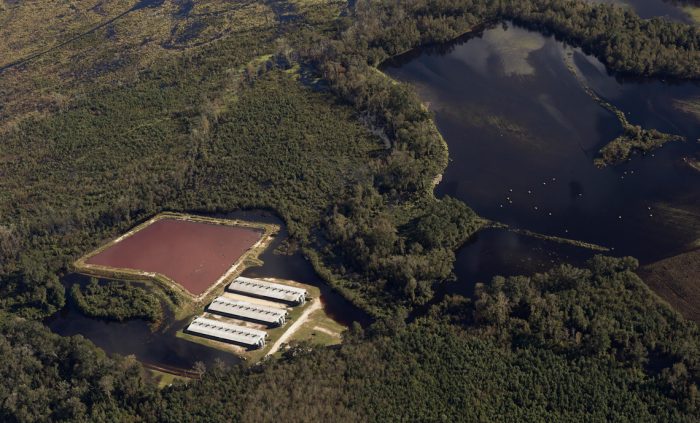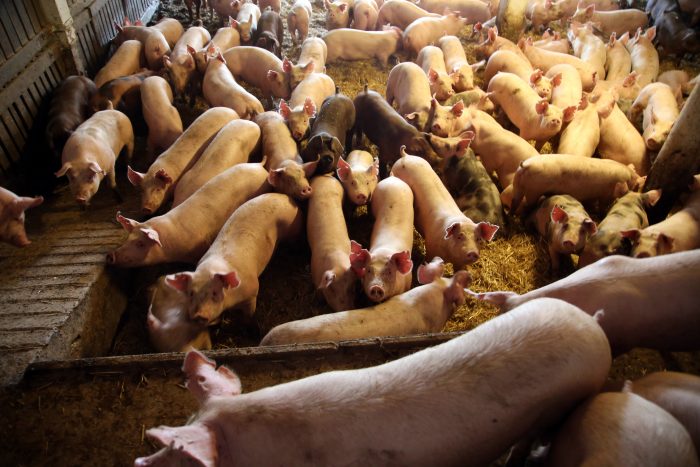SELC op-ed: A fork in the road for responsible NC hog farming
A federal appeals court ruled in November that it was ok for a jury to award monetary damages to neighbors of a Smithfield Foods controlled hog operation in Bladen County, North Carolina.
“It is past time to acknowledge the full harms that the unreformed practices of hog farming are inflicting,” wrote one judge on neighbors’ complaints that the putrid odor and other adverse impacts have long affected their rights to use and enjoy their property.
Smithfield continues to pollute neighbors’ water and air by storing vast amounts of raw hog waste in excavated lagoons and spraying it onto nearby fields, and now the company is proposing to cover many of its lagoons to capture biogas. It would then work with Dominion Energy to construct miles of pipeline to move the gas to a new facility it would construct.

The dirty truth about biogas production and how to take action in NC
Derb Carter, director of SELC’s North Carolina offices, penned this op-ed on the harm that would undoubtedly cause to nearby communities and the environment, and why Smithfield must clean up its act.
Read an excerpt of the piece below, or click here to read it in full, as published by the News & Observer this week.
Twenty years after Smithfield entered a formal agreement with the North Carolina Attorney General to convert its primitive lagoon and sprayfield waste management systems on all company-owned and contract farms to environmentally superior systems that are economically feasible, Smithfield has not converted any.
…
Now, Smithfield is proposing to cover hog lagoons on many of its hog operations, capture methane or biogas, and construct miles of pipelines to convey the gas to a processing facility it proposes to construct in Duplin County in a joint venture with Dominion Energy. The processed gas would be injected into a natural gas pipeline and used as an energy source. While removing emissions of methane that would otherwise contribute to climate change and utilizing it for energy has merit, Smithfield’s approach is dependent on perpetuating the flawed, harmful lagoon and sprayfield waste system.

Appeals court affirms Smithfield’s liability for noxious odors, noise, and pests
Flushing millions of gallons of raw hog waste from industrial-scale barns into lagoons and then spraying on nearby fields has had, and continues to have, substantial adverse impacts on the environment and many communities in eastern North Carolina.
Numerous studies have tied the lagoon and sprayfield system to increased nutrient levels that plague our coastal waters, leading to periodic algal blooms and fish kills. Capping lagoons to collect methane will actually increase the amount of nutrients generated from the hog waste, leading to more water quality problems.
And then there are the ongoing impacts to neighbors and nearby communities. Noxious odors will persist, adversely affecting nearby homeowners and their rights to clean air and the use of their property. Over the past two years, five juries have found Smithfield-owned or contract farms are nuisances, awarding the impacted neighbors millions of dollars in damages.
It is past time that Smithfield acts responsibly. If it can clean up its act in Missouri, it can do the same in North Carolina.
Derb Carter, Director of SELC’s North Carolina offices
It doesn’t have to be this way. In Missouri, Smithfield now touts its “next generation technology” to manage waste that it agreed to install on all of its hog operations there. This wholesale conversion to improved waste management was forced by lawsuits from neighbors and that state’s attorney general. It is operational and profitable on hundreds of Smithfield hog operations in Missouri.
…
Smithfield has requested that North Carolina state agencies approve necessary permits authorizing the proposed biogas project. The pending decision places eastern North Carolina at a significant fork in the road. As Smithfield has requested, the state can allow Smithfield to simply cover lagoons, capture and profit from biogas, and perpetuate the flawed lagoon and sprayfield system.
Or the Attorney General can hold Smithfield to its commitment to use economically feasible and superior waste management systems that substantially eliminate impacts to neighbors and the environment.
Before allowing Smithfield to develop its proposed biogas venture, the Department of Environmental Quality should ensure the company at a minimum employs a complete waste management system that not only taps methane but substantially reduces or eliminates odors, nutrients, and pollution.
It is past time that Smithfield acts responsibly. If it can clean up its act in Missouri, it can do the same in North Carolina.
